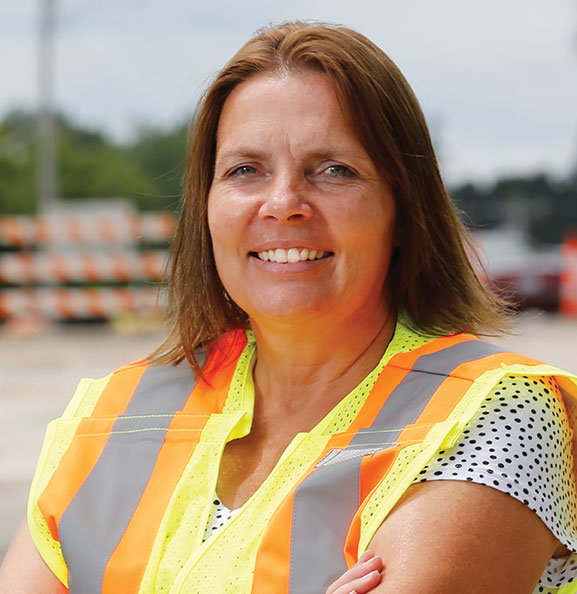 InTrans performs need-based research to improve transportation infrastructure
InTrans performs need-based research to improve transportation infrastructure
Since Iowa State’s Institute for Transportation (InTrans) first began as the Local Transportation Information Center in 1983, researchers have transformed the surface transportation landscape through innovative methods, materials and technologies.
Now, with specialization in areas that range from work zone safety and traffic engineering to sustainable pavement and integrated earthworks operations, there are nearly 200 students, professional staff and faculty working within the 16 centers and programs that make up InTrans.
The research happening within the institute focuses on developing practical and applied solutions that can be quickly implemented to improve roadways, making the traveling experience better and safer for everyone.
Take for instance InTrans’s Center for Transportation Research and Education, which is leading three of 11 research teams under the Federal Highway Administration’s SHRP2 Implementation Assistance Program. Securing these projects involved working with three state department of transportation partners to identify priorities and pull proposals together.
The teams are working on identifying driver characteristics and roadway features that play the most significant role in road departure crashes (Iowa DOT); evaluating the roles of speed and driver distraction in work zone crashes (Minnesota DOT); and determining the effects of distracted driver behavior and speed limit enforcement on crashes (Michigan DOT in partnership with Wayne State University).
Shauna Hallmark, director of InTrans and professor of civil, construction and environmental engineering, says the ability to work with transportation agencies locally and nationally, as well as private-sector and university affiliates, has been a large part of InTrans’s success.
“We offer a unique range of expertise that is in high demand as the country addresses major issues within transportation infrastructure. These relationships help speed up improvements to roadways through knowledge sharing and thorough investigation,” she adds.
As Iowa State University’s primary resource for promoting transportation education, research and extension activities, InTrans is also improving the learning environment of students, faculty and staff.
A new Traffic Operations Lab features real-time connectivity to data and system performance directly from the field to researchers and students. “The lab extends traditional training for students and gives them an opportunity to be a part of using technology to improve systems performance and safety. The lab’s big data provides opportunities to blend transportation and computer science techniques toward developing unique front- and back-end solutions for public agencies and the transportation research community,” Hallmark adds.
InTrans is also home to Iowa State’s master of science in transportation, an interdisciplinary degree with supporting academic programs in the colleges of engineering, design and business.
Educating the next generation of transportation practitioners reaches beyond those enrolled at the university through InTrans’s GO! magazine. The online publication combined with other outreach activities help K-12 students understand the variety of career needs in the transportation industry.
“The educational component of InTrans is crucial for our institute,” Hallmark explains. “We’ve spent countless hours creating programs and activities that address everything from policy to maintenance to make the transportation system more durable, reliable, safe and sustainable. We have to prepare others to keep the momentum moving forward.”
That momentum includes more than $13.6 million research dollars secured in 2014 from federal, state and private funding. “The increase we’ve seen in high-profile projects shows that we’re a talented team of researchers dedicated to delivering results. We’re excited to continue assembling and supporting world-class teams through new projects.”